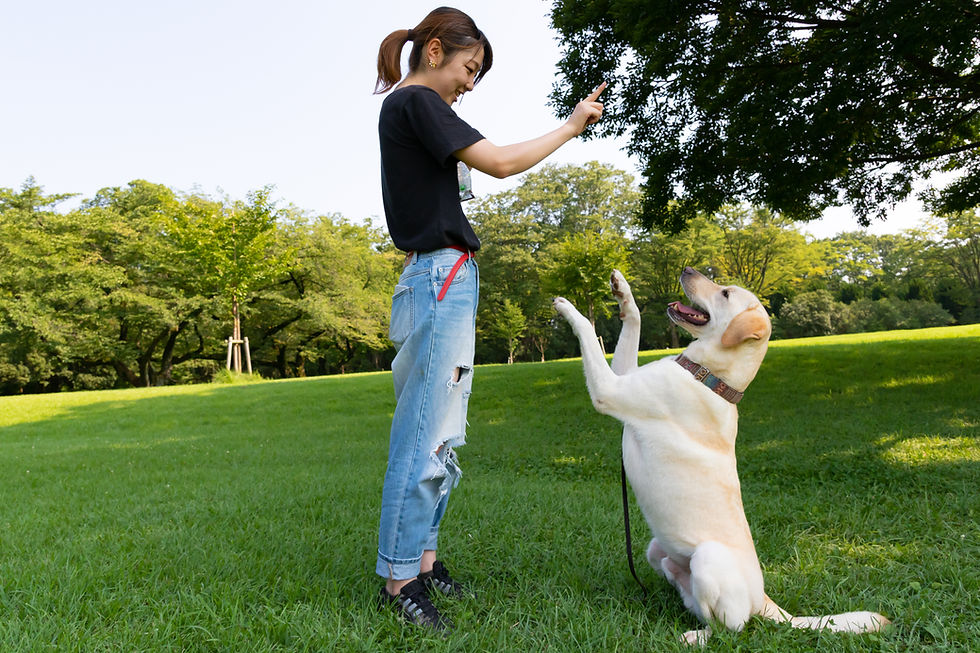Senior Pet Care
- trainloyalcompanions
- Feb 19, 2025
- 3 min read
Aging is a natural part of life, and both dogs and cats experience it uniquely. As they grow older, they may encounter changes in mobility, senses, and overall health. Creating a supportive, comfortable environment tailored to their evolving needs can enhance their well-being. Aging pets have been faithful companions, and they deserve all of our love, patience, and attention.

Creating a Comfortable Home
Adjust your dog’s environment to be safe and accessible. Place rugs or mats on slippery floors to prevent falls, especially for dogs with joint issues. Older dogs may also appreciate quiet, undisturbed spaces for restful sleep. Consider an orthopedic bed to support aging joints.
Cats often prefer elevated spots, so provide ramps or steps to their favorite perches. As they may struggle with balance or mobility, ensure a low-sided litter box is available, and keep a quiet resting spot accessible, away from household hustle and bustle.
Nutrition and Weight Management
As dogs age, their nutritional needs change. Older dogs often benefit from high-quality protein to support muscle maintenance without adding unnecessary weight. Consult your vet about a diet that supports joint health and digestive efficiency.
Aging cats often have different dietary needs too, especially with kidney or digestive concerns. Work with your vet to choose a high-protein, low-phosphorus diet to support aging kidneys. Since cats can lose interest in food, consider warmed wet food for better palatability.
Regular Veterinary Visits
Both senior dogs and cats benefit from more frequent check-ups, ideally every six months. Regular exams help monitor for early signs of age-related conditions such as arthritis, kidney disease, dental disease, or changes in vision and hearing.
Mind and Body Exercise
Senior dogs still need exercise, but it should be gentle and adjusted to their energy levels. A daily walk stimulates both mind and body, keeping joints active without over-exerting them. Mental stimulation through games or training new, simple tricks is also beneficial.
Even older cats need mental and physical activity. Short play sessions with feather wands or puzzle toys help maintain mental sharpness and agility. Keep playtimes short but engaging, as older cats can tire more quickly.
Potty Breaks
Aging dogs may need more frequent potty breaks. Changes in kidney function can mean they need to go outside more often. Be patient and consistent, as accidents may happen.
Older cats might also struggle with litter box habits, particularly if arthritis makes jumping in and out of high-sided boxes painful. Ensure they have easy access to a clean, low-sided litter box on each floor of your home.
Joint Health
Consider joint supplements like glucosamine or fish oil, which can help reduce joint discomfort. Look out for signs of stiffness, limping, or hesitation to jump or climb, which can imply joint pain.
Joint supplements can also be beneficial for aging cats. If you notice your cat has difficulty jumping or grooming, consult your vet. Cats tend to hide pain, so subtle changes in movement can often be your first clue.
Maintaining a Safe and Cozy Space
Provide your dog with a dedicated, comfortable bed in a low-traffic area where they feel secure. Blind or vision-impaired dogs may benefit from a predictable environment without sudden rearrangements.
Cats often seek out cozy hiding spots. Ensure their space remains stable without frequent furniture changes. Blind or partially sighted cats can navigate well in familiar spaces but may struggle if items are moved often.
Dental Health
Dental health is especially important for senior pets. Use enzymatic pet toothpaste or offer dental treats to support oral hygiene. Regular dental cleanings by a veterinarian can prevent pain and potential infections.
Vision and Hearing Accommodations
Older dogs with diminished vision or hearing may need extra cues to navigate their environment. Teach commands like “step” or “wait” to help guide them through different terrains.
A blind or visually impaired cat may benefit from scent markers or textured surfaces to help them identify safe paths. Be mindful that sudden touches can startle a hearing-impaired or blind cat; talk to them as you approach.
Emotional Health and Quality of Life
Senior pets need time and patience as they adapt to changes. Spend quality time with them, and consider their physical comfort, mental stimulation, and emotional needs. Quality of life assessments can be helpful in guiding care decisions as they age, and compassionate euthanasia may sometimes be the kindest choice when their health significantly declines.
Check out Ohio State University Medical Center’s Honoring the Bond Program.
Additional Resources for Senior Pet Support
Grey Muzzle Organization - www.greymuzzle.org - Resources for senior dog care.
Blind Dog Support - www.blinddogsupport.com - Guidance for living with blind pets.
Rainbow Bridge - www.rainbowsbridge.com - Emotional support for pet loss and grief.



